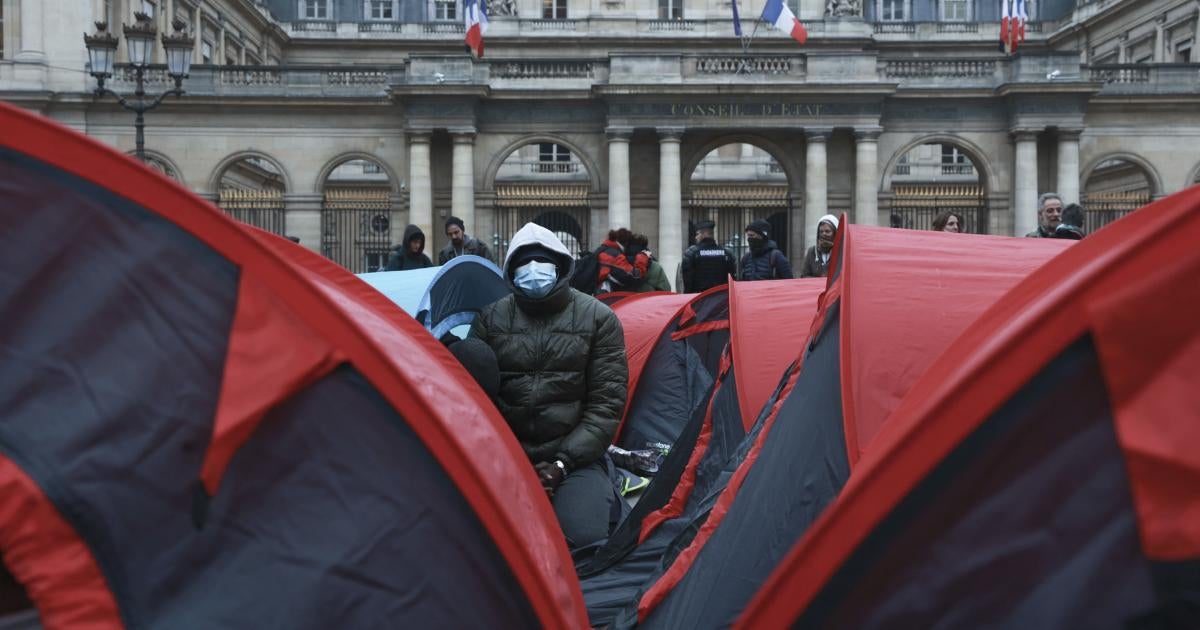(Paris) – France’s lawmakers are examining a draft immigration law that threatens to limit rights of asylum seekers and migrants, Human Rights Watch said today.
The draft law is to be debated in the French Senate starting on November 6, 2023, and is expected to move to the National Assembly in December. The government initially introduced the bill in February but in March postponed debate because of a lack of support in parliament.
“The French authorities are trying again to put forward a deeply flawed set of immigration measures,” said Eva Cossé, senior Europe researcher at Human Rights Watch. “Dividing families and watering down rights for asylum seekers is not the answer to the country’s security concerns.”
Key concerns in the bill include:
- Provisions to weaken existing protections, both for foreign nationals ordered to leave France and those being forcibly removed.
- A provision to withdraw or refuse to renew a residence permit for a person who does not comply with “the principles of the Republic.”
- Provisions to weaken rights of appeal for asylum seekers and for administrative procedures related to migrants.
- Inclusion of a limited provision to end detention of migrant children under age 16 that would not protect children in French overseas territories, particularly in Mayotte, and those detained at borders or airports.
The draft law would enable the authorities to issue an order to leave French territory even if a person falls into a category or categories protected under existing law. Existing protections relate to personal and family situations, such as for those who arrived in France before the age of 13, have long-term residence in France, or are a spouse or parent of a French national.
The draft law would allow authorities to disregard these protections if the foreign national’s behavior is regarded as “a serious threat to public order,” despite the vagueness in the bill of the terms “serious threat” and “public order,” Human Rights Watch said.
The bill would also remove protections with respect to expulsion, an administrative measure aimed at removing a foreign national from French territory. Under current law, an expulsion order can be issued against a foreign national living irregularly in France who is deemed a “serious threat to public order,” including if they demonstrate behavior considered detrimental to the “fundamental interests of the state,” “engage in terrorism,” or “encourage discrimination, hate or violence.”
There are currently protections against expulsion for foreign nationals that mirror those for an order to leave France. The bill widens the circumstances in which people in those protected categories can nonetheless be expelled if they are deemed a “serious threat to public order,” lifting the few safeguards for the so-called protected categories. Under existing law, a person can be expelled if they have received at least a 5-year prison sentence. Under the proposed law, anyone convicted of an offense that can carry a 5-year prison sentence could be expelled, even if they received a much shorter sentence.
The French Defender of Rights, who has heavily criticized the entire bill, noted that the planned changes are to “the detriment of the protection of foreigners’ fundamental rights.” The United Nations Children’s Fund (UNICEF) also criticized the provisions. UNICEF said that weakening protections on the expulsion and removal of foreign nationals – in particular parents of French children – is likely to conflict with the UN Convention on the Rights of the Child, to which France is party, and which protects family life and the principle of non-separation.
In addition, the French interior minister has signaled that the government intends to add another provision to the bill to make it easier to deport foreign nationals with suspected links to “radical ideology,” citing the alleged killer of a teacher in a school in France in October. The alleged perpetrator, a former student, was indicted on charges including terrorism-related murder. The French authorities regard removing foreign nationals deemed a threat as an important element in combating violent extremism, even if this means weakening rights safeguards.
The bill also reintroduces a provision from a controversial law against “separatism” that had been censured by the Constitutional Council, France’s highest constitutional authority, on the grounds of vagueness. The provision, which was amended following the censure, would now be reinstated, allowing the authorities to withdraw or refuse to renew residence permits for people who do not comply with “the principles of the Republic,” a measure that appears to target Muslims deemed to engage in “separatism.”
The bill would also weaken procedural safeguards for migrants and asylum seekers, including by changing panels hearing asylum appeals in most cases from three judges to one, removing specialist judges from the process. The French Defender of Rights said that the move risks undermining the right to an effective remedy for asylum seekers and is likely to “deprive applicants of the fundamental procedural guarantees of fair justice, namely the independence and impartiality of justice.”
The bill also reduces the time limits for appeals in various asylum and immigration processes, making it harder for migrants and asylum seekers to gather the evidence needed to present their case. It would also allow for video hearings, which are often plagued in France by technical problems, according to a 2020 report by the nongovernmental group European Council on Refugees and Exiles. Together these measures undermine the right to an effective remedy, as required by international and European law.
The bill would ban immigration detention of children under age 16 in administrative detention centers. While this is a positive step, it would still allow the detention of thousands of children including those over 16. It would also allow detention of children in French overseas territories, particularly Mayotte, and those detained at borders or airports. The European Court for Human Rights has repeatedly ruled against France’s detention of children. French lawmakers should take the opportunity to end the immigration detention of all children, Human Rights Watch said.
Other concerns include restrictive measures relating to unaccompanied children and young adults added by the Senate Law Commission in March, which UNICEF has described as “particularly problematic,” and the proposed abolition of State Medical Aid, a system that allows irregular migrants to access general health care. It is replaced in the latest version of the bill with much more limited access for emergencies.
The draft law also fails to address abusive migration policies and practices by French authorities. They include harassment by the police; restrictions on access to humanitarian assistance, particularly in northern France; summary rejection of unaccompanied children at the French-Italian border; and denial of access for unaccompanied children on French territory to protection and essential services.
“French lawmakers should reflect on what immigration reforms France really needs, including an end to detention of all children, meaningful access to asylum, effective protections against unjust removal, and humane treatment for people on the move,” Cossé said. “Rolling back human rights protections won’t make France safer.”


